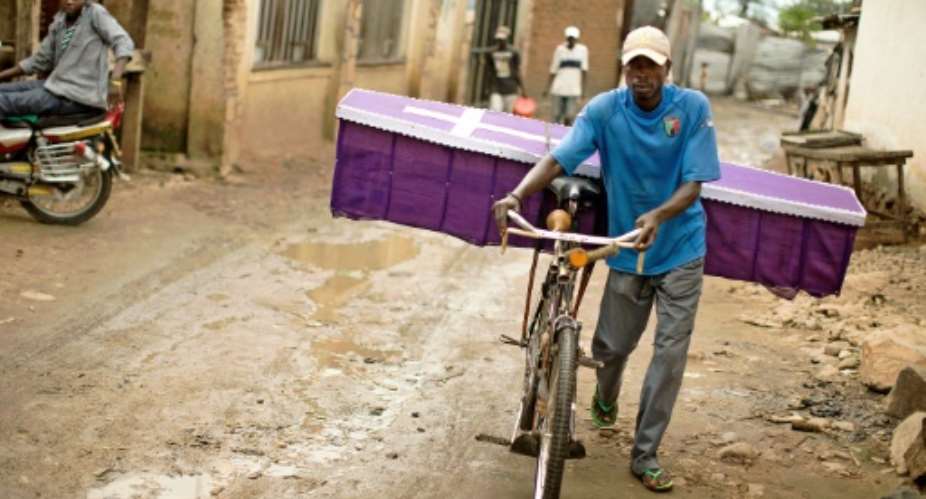Addis Ababa (AFP) - UN Secretary-General Ban Ki-moon warned African leaders Saturday of the need for action in troubled Burundi at a summit hoping to end armed crises across the continent.
African Union leaders face an unprecedented vote on deploying a 5,000-strong peacekeeping force despite Burundi's vehement opposition, but Ban was clear troops were needed to stem violence.
"Leaders who stand by while civilians are slaughtered in their name must be held responsible," Ban said, adding the crisis in Burundi required the "most serious and urgent commitment".
He said the UN backed the AU's proposal "to deploy human rights observers and to establish a prevention and protection mission" in Burundi.
Talks at the AU Peace and Security Council, attended by presidents and foreign ministers from across the 54-member bloc, stretched late into Friday night in an attempt to narrow positions before the formal summit began on Saturday.
AU commission chief Nkosazana Dlamini-Zuma opened the summit by commemorating AU peacekeepers killed in "efforts to silence the guns", amid fierce backroom debate on whether to send a new force to Burundi.
Talks on the possible peacekeeping deployment are being held behind closed doors and it is unclear when a vote may be taken.
- 'Unimaginable suffering' in South Sudan -
While the official theme of the African Union (AU) meeting is human rights, leaders are again dealing with a string of crises across the continent during two days of talks at the organisation's headquarters in the Ethiopian capital.
Ban also warned of the need for action amid stalled talks to end war in South Sudan.
"Leaders in South Sudan have again failed to meet a deadline to form a transitional government," Ban said. "Instead of enjoying the fruits of independence, their people have endured more than two years of unimaginable suffering."
Neither Burundi's President Pierre Nkurunziza nor South Sudan President Salva Kiir are believed to be attending the summit.
"Leaders must protect their people, not themselves," Ban added.
AU Peace and Security Council chief Smail Chergui warned "the stakes are indeed high", but Burundi remained defiant in its opposition to a mission it calls an "invasion force".
Burundian Foreign Minister Alain Nyamitwe on Friday insisted he had the backing of other nations. Asked whether he had support of others in opposing the proposed force, Nyamitwe said, "Yes, very strong, you will see."
Street protests, a failed coup and now a simmering rebellion began when Nkurunziza announced his intention to run for a controversial third term, which he went on to win in July elections.
Hundreds have died and at least 230,000 have fled the country in the months since.
- Chad's Deby new AU president -
"We have said that the deployment of this force is not justified," Nyamitwe said. "We believe that the situation in the country is under control."
With Nkurunziza unmoved by AU and UN appeals, there have already been moves to water down the proposed military force to that of an observer mission.
"It is not only Burundi that is resisting this idea... most interveners in a country are not welcomed," Gambian President Yahya Jammeh said.
Jammeh said he would not support a military deployment "without the consent of Burundi".
A two-thirds majority will be required to send the force, named the African Prevention and Protection Mission in Burundi (MAPROBU). It remains unclear who would be willing to contribute troops.
"In addition to Burundi's lobbying efforts, many heads of states will be reluctant to set a precedent of AU troop deployment in a country that clearly rejects it," said Yolande Bouka, of the Institute for Security Studies (ISS) think tank.
Chad's President Idriss Deby also took over as AU chairman, replacing Zimbabwe's President Robert Mugabe in the one-year ceremonial post.
Deby told fellow presidents that conflicts across the continent had to end.
"Everything that we are doing now will be in vain and without purpose if we allow Africa to go through these perpetual crises: South Sudan, Libya, Somalia, Burundi, the Sahel, the Lake Chad basin," Deby said.
"Through diplomacy or by force... we must put an end to these tragedies of our time."





 This IMANI job no dey pap; the people you are fighting for are always fighting y...
This IMANI job no dey pap; the people you are fighting for are always fighting y...
 Prof. Naana Opoku-Agyemang has changed; you can see a certain sense of urgency –...
Prof. Naana Opoku-Agyemang has changed; you can see a certain sense of urgency –...
 MFWA Executive Director slams Akoma FM for engaging in ‘irresponsible’ media pra...
MFWA Executive Director slams Akoma FM for engaging in ‘irresponsible’ media pra...
 ‘Women must become millionaires too’ — Prof Jane Naana on establishment of Women...
‘Women must become millionaires too’ — Prof Jane Naana on establishment of Women...
 Some believe only in Ghanaian votes, not Ghana — Kofi Asare jabs politicians
Some believe only in Ghanaian votes, not Ghana — Kofi Asare jabs politicians
 Plan to make BEST sole aggregator of Sentuo Oil Refinery will create market chal...
Plan to make BEST sole aggregator of Sentuo Oil Refinery will create market chal...
 2024 elections: I can't have the man I removed from office as my successor — Aku...
2024 elections: I can't have the man I removed from office as my successor — Aku...
 2024 Elections: Immediate-past NPP Germany Branch Chairman garners massive votes...
2024 Elections: Immediate-past NPP Germany Branch Chairman garners massive votes...
 Gov’t focused on making Ghana energy self-sufficient, eco-friendly – Akufo-Addo
Gov’t focused on making Ghana energy self-sufficient, eco-friendly – Akufo-Addo
 April 25: Cedi sells at GHS13.74 to $1, GHS13.14 on BoG interbank
April 25: Cedi sells at GHS13.74 to $1, GHS13.14 on BoG interbank
